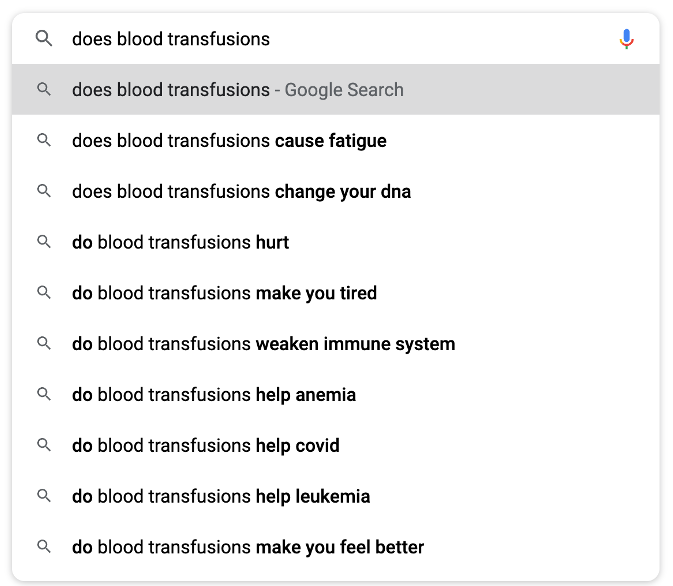
Most Commonly Googled Questions About Blood Donation — Answered by the Experts, Part 5
Have you ever turned to Google for help before a donation? Say, to find out how you could bulk up on iron, or to find out if your newfound cold would be cause for deferral? Or perhaps you asked Google a few questions before you made an appointment, to see if blood donation was right for you — whether it’s really effective, how much it hurts (which can be a daunting fear the first time), whether you’d feel tired after?
Whether you’ve directly contributed to Google’s database of questions or not, the truth is, blood donation is a very commonly searched topic. To help shed light on some of the most common inquiries and misconceptions around blood donation, we sat down with some of our SBC experts and asked them some of the most popular questions on the Internet about blood donation, as determined by the phrases Google uses to autocomplete the start to blood donation questions. For five weeks, we’re sharing answers to the top Googled questions in a few categories: “Can I donate blood…?”; “Does blood donation…?”; “How does blood donation…?”; “Are blood donations…?”; and “Do blood transfusions…?”
 This week — our final one! — we’re pivoting to the patient side by covering the most commonly Googled questions based on typing “Do blood transfusions,” as answered by SBC’s Medical Director, Dr. Tho Pham! All the questions we’ll be answering are in this article’s header image so feel free to browse for the ones you’re especially anxious to know down below, or test your knowledge against our expert!
This week — our final one! — we’re pivoting to the patient side by covering the most commonly Googled questions based on typing “Do blood transfusions,” as answered by SBC’s Medical Director, Dr. Tho Pham! All the questions we’ll be answering are in this article’s header image so feel free to browse for the ones you’re especially anxious to know down below, or test your knowledge against our expert!
Do blood transfusions cause fatigue? / Do blood transfusions make you tired?
No — in fact, the transfusion of blood tends to give patients energy! A great example of this comes from one of our blogs about donor Dr. Brad Heart and his recipient mother, Frances Heart. In the blog, Brad said, “Every six weeks, my mom receives a blood transfusion, and it’s truly night and day. You can tell she feels run down toward the end of her six weeks, but, within an hour of getting the next transfusion, she’s full of energy!”
Do blood transfusions change your DNA?
No, receiving a donation does not alter the patient’s DNA. Interestingly, though, in most people, it is possible to detect a very small amount of the donor’s DNA in the recipient’s blood for a few days after the transfusion. However, it tends not to remain in the recipient’s system long and, on genetic tests, is easy to identify as foreign due to its minuscule presence.
Do blood transfusions hurt?
The feeling a patient experiences when getting a transfusion is like what you feel when you donate: typically, just a pinch when the needle is going in and when it’s going out.
Do blood transfusions weaken the immune system?
While transfusions can impact the immune system, the way in which (and how often) they affect individual patients is not fully understood, which is why it’s important to talk to your doctor about the risks and benefits of transfusion. For example, while in some cases it should mean you need to be more careful not to catch a cold, in other instances, transfusions can be really beneficial to a patient; for example, prior transfusions correlate to decreased rates of organ transplant rejection.
Do blood transfusions help anemia?
Yes! The transfusion of healthy red cells help counteract the effects of anemia. And, in fact, those with sickle cell anemia (when their red cells are abnormally shaped) often depend on transfusions their entire lives.
Do blood transfusions help COVID?
Near the start of the pandemic, COVID-19 convalescent plasma was given emergency use authorization to be collected and transfused to patients. The idea is that plasma from individuals who recently recovered from COVID-19 has antibodies to the virus, which have the potential, when transfused to someone currently battling COVID-19, to help the recipient’s body fight the virus. While CCP is still being studied, research has shown that CCP likely does help COVID-19 recovery in limited settings, namely in immunosuppressed patients (meaning they have difficulty producing enough of their own antibodies) early in disease course.
Do blood transfusions help leukemia?
Yes, transfusions are often critical for individuals with leukemia to help them replace the cancerous (and non-cancerous) blood cells that are being destroyed through chemotherapy.
Do blood transfusions make you feel better?
Absolutely. Transfusions are given to help patients, and while we can all think of times when medical treatments can do good overall but feel awful in the short run, transfusions tend to have an immediate positive effect on those who receive them. Our blog is filled with countless stories of individuals who report feeling full of life after their transfusions.
Read the rest of our Google Q&A series on our blog.
